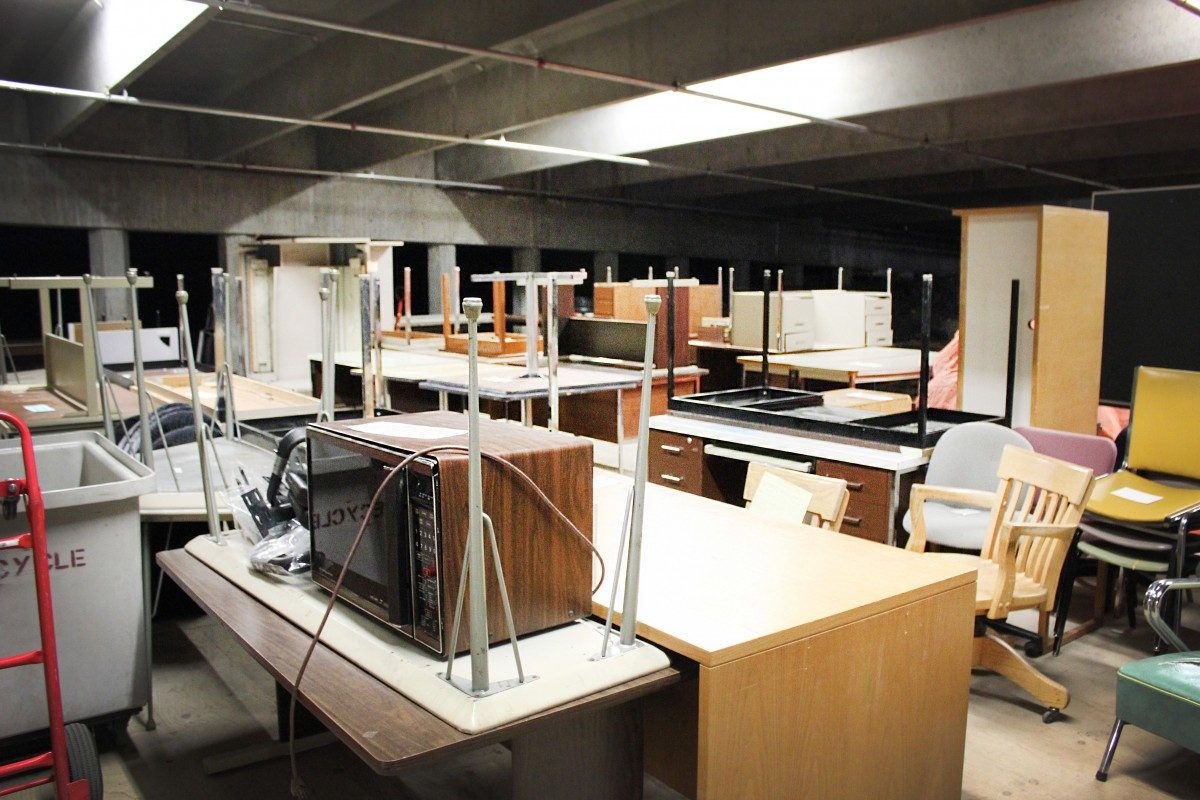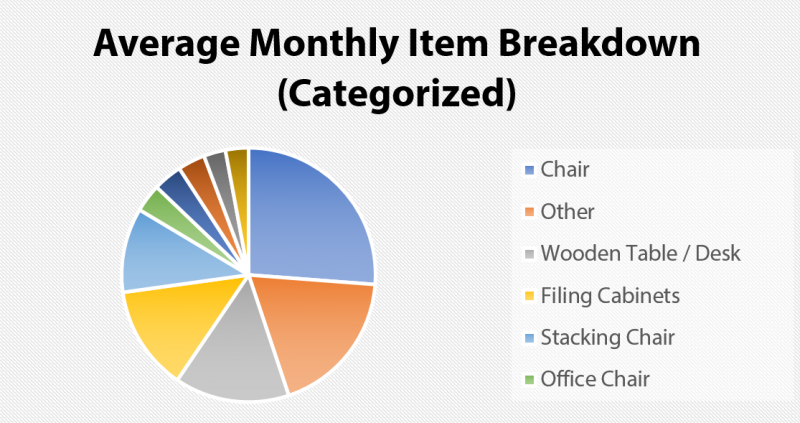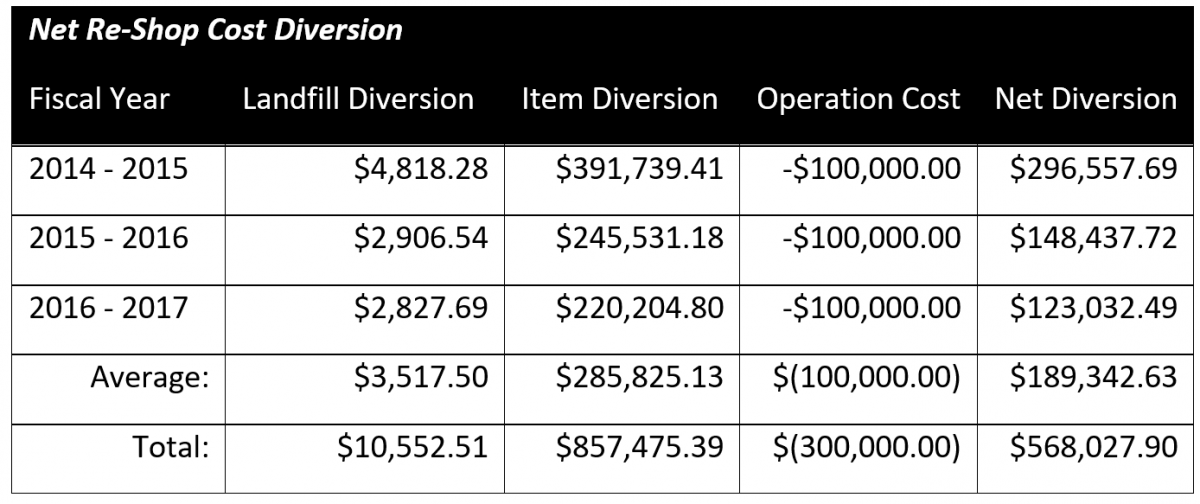
Re-Shop: Hidden treasures and thousands of dollars saved
The University of Manitoba Re-Shop: a campus waste diversion program dedicated to repurposing office furniture and supplies with no home. With no further details, you might already be picturing piles of broken chairs, dusty bookshelves, and tacky couches from some bygone day. However, with a quick visit to the Re-Shop you discover rows of pristine office desks, gleaming filing cabinets, a huge variety of comfortable office chairs, and maybe even stumble upon some strange yet wonderful treasure.
Recently, the Office of Sustainability collected and analyzed Re-Shop inventory data spanning back to April 2013. The data gives a glimpse at the past repurposed items, and tells the story of the growth and success the Re-Shop has experienced over the years. There are many interesting finds about the types of items passing through the Re-Shop, and with a comparison of repurposed items to their market costs, the overall value the Re-Shop possesses within the University community has been estimated to be nearly $200,000 annually.
Since 2013, there has been approximately 4,500 items repurposed through the Re-Shop. This trend began with an annual total of 100 items from 2013 – 2014, and has grown to over 1,000 repurposed items annually. There is also a huge variety in the items being repurposed. The individual item data was collected and items were then grouped into over 100 unique categories!
Of the 4,500 items, about 40% were some sort of chair including office and stacking chairs, 15% were a wooden or folding table, and the remaining 45% span across the numerous remaining categories. These other categories include standard furnishings such as bookshelves, lockers, chalkboards, lamps, and computer monitors. There are also many uncommon categories in smaller magnitudes such as podiums, keyboards, couches, and sinks. There are even some rare and exciting “treasures” that have been repurposed such as mini-fridges, safes, binding machines, projectors, and aquariums.
Based on the repurposed item information alone, it is clear that the Re-Shop is serving its role repurposing items, but how is the Re-Shop affecting the University community? Who is benefitting, and where are the repurposed items going? To answer these questions, we dug through old records and discovered Re-Shop sign-in sheets with information on 611 visitors from April – August, 2014. The sign-in sheets recorded the visitors’ positions at the University whether it be student, staff, or faculty, as well as what group or faculty the visitor was affiliated with. With this data, the following distribution of users was discovered:
- 50% of these visitors were students on campus
- 45% were staff
- 5% were non-profit organizations and faculty
The further sign-in sheet details on faculty / group association revealed that:
- 40% of visitors were from the Faculty of Engineering (primarily students)
- 22% were campus staff or from a campus office
- 14% were from the Faculty of Science
- 13% were from the Faculty of Arts
- 11% were from 30 other groups
It is worth noting that this data was primarily from the Summer of 2014, the magnitude and likely the type of visitors slightly fluctuates throughout the year. Despite the fluctuation, it is still clear that the Re-Shop directly benefits campus students and staff. A group could even rely solely on the Re-Shop for furnishings. For example, the Office of Sustainability which has acquired all meeting tables, office workstations, cabinets, office chairs, desks, and sofas from the Re-Shop.
The Value of the Reshop
The goal of the Re-Shop is to repurpose items and reduce campus waste, this provides a multitude of benefits to the University community. The benefits include
- providing the University community with free furnishings
- promoting social sustainability and the idea of reusing items, reducing furniture expenses for the community by repurposing an item versus buying it new
- reducing University expenses associated with disposal fees
- cutting back on the carbon emissions associated with waste transport and waste decomposition, and reducing the carbon emissions and energy use associated with producing and transporting new furniture versus reusing furniture
Unfortunately, some of these benefits are difficult to measure such as energy and carbon emission reductions. What can be found, however, is a dollar value associated with repurposing furniture instead of buying it new. Using a variety of office supply companies as a reference, the average costs for the recorded item categories was found. The cost data was compared with the repurposed item data and we found how much money would be spent each fiscal year if all repurposed items were purchased new. This value is labelled as the cost diversion in the table below.
The other cost estimated was the landfill fee that is avoided each year by repurposing items instead of disposing them. Office supply companies were referenced to find average furniture weights for each of the repurposed item categories. The total weight diverted from landfills was then calculated and compared with the standard commercial disposal rates at the Brady Landfill. This value is labeled as the landfill diversion..
Using our estimated cost diversions from above combined with the annual Re-Shop operation cost of $100,000 we calculated what cost is saved by the university community each year. It was found that the average annual savings are around $190,000 adding up to a total community cost diversion around half a million dollars since April, 2014.
Between the social and economic benefits to the University Community and the sustainable benefits associated with carbon and energy use reductions, it is clear that the Re-Shop has grown to be incredibly successful. With $100,000 of repurposed items already recorded for the first half of the 2017 – 2018 fiscal year, the Re-Shop will continue to be a successful program with benefits that far outweigh all operation costs.
Campus staff, students, and charity groups are welcome to come by every Tuesday to browse through the University of Manitoba Re-Shop inventory and take anything they are interested in. Take a look and see what you can discover!
Campus Re-Shop
149 Helen Glass Center (Basement)
Tuesdays, 9:00 a.m. – 12:00 p.m. & 1:00 – 3:00 p.m.
Note: The Re-shop is not heated. Jackets are recommended.









Are you still open throughout the summer?
The Re-Shop is open during the summer, Tuesdays, 9 am – 12 pm & 1 pm – 3 pm. Hours may vary.